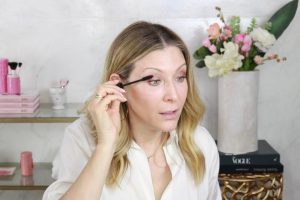Antioxidants have made the move from your green smoothie to the bathroom shelf in recent years, and for good reason: They’re brimming with skincare benefits. But the why and the how of antioxidants’ benefits can be a little fuzzier, especially when it comes to your skincare.
That’s where we come in. If your skin barrier is your first line of defense against the outside world, then antioxidants are like your offense. On the surface of your skin, they work to neutralize damaging particles created by environmental aggressors. Not only that, but these overachievers also work within skin to repair any existing impact.
And, in preventing damage to skin, antioxidants can address a number of skin concerns, says NakedPoppy research scientist Marisa Plescia. “This includes the appearance of fine lines and wrinkles, an uneven and dull skin tone, hyperpigmentation, and the breakdown of collagen in the skin,” she says.
Here’s a run-down of how they work:
- Antioxidants counteract free radicals, unstable molecules that damage skin
- In neutralizing free radicals, antioxidants defend skin against the effects of sun and pollution
- Antioxidants can defend and repair dark spots, fine lines, and crepey texture
- Popular antioxidants include vitamins C, E, and A, as well as plant-derived nutrients
- Apply it in the morning in most cases, with the exception of ingredients like retinol
- Pair antioxidants and sunscreen for the most sun-protective benefits
With that in mind, here’s the scoop on these skincare superstars.
How do antioxidants work for the skin?
We can’t really talk about antioxidants without first introducing free radicals, which have a field day on skin. “Free radicals are highly unstable molecules that are naturally formed in your body from normal metabolic processes or from environmental factors such as UV exposure, ozone, cigarette smoke, and even pollution,” says Plescia.
These free radicals can accelerate skin aging, particularly signs of aging caused by environmental factors — think UV radiation and air pollution. That’s kind of a big deal. “UV radiation exposure contributes significantly to free radical generation and oxidative stress, which can account for about 80% of extrinsic skin aging and lead to skin cancer,” says Plescia. (Extrinsic aging is caused by external factors, versus internal factors like genetics.)
But there’s hope yet, largely in the form of antioxidants. “An antioxidant is a potent compound that helps fight free radicals in your body and help prevent or slow damage to the cell caused by oxidative stress,” says Plescia. They essentially stabilize the otherwise unstable free radicals, putting them out of commission and ultimately defending skin from damage. In doing so, they protect against the many signs of sun damage, such as hyperpigmentation, uneven skin tone, fine lines and wrinkles, and crepey skin texture.
Which antioxidants are best for skin?
Not all antioxidants are created equal. In addition to offering protection to skin, some can also brighten, while others increase cell turnover to smooth and firm skin. And while some are naturally produced by your body, you can get the max benefits by supplementing them in your skincare routine. These are among the most common (and potent).
Vitamin C
It’s not all hype — vitamin C has the track record to back up its popularity. “Vitamin C is one of the most studied antioxidants available to use in skincare,” says Plescia. “In addition to being a free racial scavenger, it has many other skin benefits, such as encouraging collagen production and helping to fade dark spots and other skin hyperpigmentation.”
In Indie Lee Daily Vitamin Infusion, it’s paired with skin barrier-supporting ceramides for a hit of hydration. Heads up: Vitamin C can be unstable in some forms, meaning it could break down easily, so “storing it in a cool place, away from light, and also making sure to tighten the top back on after use is essential for potency,” says Plescia.
Vitamin E
It’s famously soothing for dry skin, but there’s more to vitamin E than you might think. “In the skin, in addition to helping to protect the cells against free radicals, it is also an effective moisturizing agent and helps improve the elasticity and smoothness of the skin,” says Plescia.
Plus, research shows that vitamins C and E may have a synergistic effect, too — meaning together, their benefits are increased. [1] That’s why you can find them together often, as in KYPRIS Antioxidant Dew Face Serum.
Vitamin A
Vitamin A, often found in skincare as the derivative retinol, is yet another antioxidant (in addition to all its other perks). “Retinol can address most common skincare concerns, from acne to aging, since it helps influence many cellular processes, such as cellular growth and differentiation and a healthy immune response,” says Plescia. If lines and wrinkles are a concern, retinoids are a solid option for both repairing existing signs of sun damage and minimizing future changes.
Many plants — not to mention their resulting fruits and veggies — are also brimming with antioxidants, which can be harnessed in your skincare formulas. For instance, Maya Chia The Optimist is blended with antioxidant-rich white tea, while Maya Chia The Super Blend contains astaxanthin, which is derived from algae. Chlorophyll in Ere Perez Quandong Green Booster Serum functions as an antioxidant, and spinach extract in the formula adds to its high antioxidant content.
With antioxidants, think the more, the merrier — many are naturally produced by the body, anyway. For instance, Indie Lee CoQ10 Toner has the headliner CoQ10, or Coenzyme Q10, which is naturally found throughout your body.
How to use antioxidants in your skincare routine
You can often find antioxidants in toners, serums, and face oils (particularly those high in plant oils, as is NakedPoppy Revitalize Organic Facial Oil, since plant oils are rich in antioxidants). Aside from the latter, which can serve as your moisturizer when applied to damp skin, use it after cleansing and before your moisturizer.
To get the most out of it, apply your antioxidant product in the morning, as the goal is to “pretreat” skin with antioxidants before sun exposure. Since sun damage happens so quickly, Plescia explains, antioxidants may only prevent damage when it’s actually happening — more so than addressing damage after the fact.
The exception to this is with vitamin A, as retinoids can break down more quickly in sunlight and are therefore best saved for your nighttime routine only.
And sunscreen is, of course, a must. “Using antioxidants in the A.M. alongside SPF is more or less
‘prepping’ the skin for the UV exposure and providing the skin with a high concentration of antioxidants to use when exposed to the sun,” she says. “Studies show that sunscreen products formulated with antioxidants may further decrease UV-induced damage compared with sunscreen alone.” [2]
The best part: Once you have your antioxidants in hand, you can start reaping those benefits, stat. So if you’re not yet using it, consider this your cue — and get ready to see what antioxidants can do for you.
Get “shockingly accurate” clean beauty picks. Take your beauty assessment.
Shop the story:
- Indie Lee Daily Vitamin Infusion 🍓
- KYPRIS Antioxidant Dew Face Serum 💦
- Maya Chia The Optimist ☀️
- Maya Chia The Super Blend 💫
- Ere Perez Quandong Green Booster Serum 🌿
- Indie Lee CoQ10 Toner 💧
- NakedPoppy Revitalize Organic Facial Oil 🌹
References
[1] research shows that vitamins C and E may have a synergistic effect, too — meaning together, their benefits are increased.
https://pubmed.ncbi.nlm.nih.gov/12789176/
[2] Studies show that sunscreen products formulated with antioxidants may further decrease UV-induced damage compared with sunscreen alone.






Comments